Rossini : Il Turco In
Italia
Riccardo Chailly / La Scala Orchestra and Chorus
London 289-458-924-2 / Polygram
**** $$$
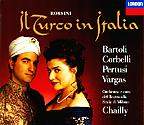 Many recent major label
opera recordings have been disappointing, but this one is really
superb, an instant classic. Rossini’s dramma buffo, Il Turco in
Italia (1814), has traditionally suffered by comparison with his
earlier, similar L’Italiana in Algeri (1813), but this excellent
recording should charm even die-hard sceptics. Chailly’s Italian
lead singers are all exemplary. Michele Pertusi as the opera’s
eponymous Turk deploys an ideal voluptuous bass-baritone. Alessandro
Corbelli as the cuckolded husband Don Geronio proves himself the
Rossini baritone of our day, with a stunning command of the
tongue-twisting patter arias. Cecilia Bartoli has never sounded
better than in her portrayal of the naughty flirt Fiorilla.
Her entrance aria “Non si dà follia maggiore” is fabulous, and her
coloratura flights in “Caro padre” are breathtaking. Not since
Marilyn Horne have we heard singing of such brio, virtuosity and
panache. Only Mexican tenor Ramón Vargas is substandard. The
orchestra and choir are excellent. The recorded sound is warm and
clear, with a real sense of living theatre. Libretto and notes in
Italian and English only. Many recent major label
opera recordings have been disappointing, but this one is really
superb, an instant classic. Rossini’s dramma buffo, Il Turco in
Italia (1814), has traditionally suffered by comparison with his
earlier, similar L’Italiana in Algeri (1813), but this excellent
recording should charm even die-hard sceptics. Chailly’s Italian
lead singers are all exemplary. Michele Pertusi as the opera’s
eponymous Turk deploys an ideal voluptuous bass-baritone. Alessandro
Corbelli as the cuckolded husband Don Geronio proves himself the
Rossini baritone of our day, with a stunning command of the
tongue-twisting patter arias. Cecilia Bartoli has never sounded
better than in her portrayal of the naughty flirt Fiorilla.
Her entrance aria “Non si dà follia maggiore” is fabulous, and her
coloratura flights in “Caro padre” are breathtaking. Not since
Marilyn Horne have we heard singing of such brio, virtuosity and
panache. Only Mexican tenor Ramón Vargas is substandard. The
orchestra and choir are excellent. The recorded sound is warm and
clear, with a real sense of living theatre. Libretto and notes in
Italian and English only.
Adolphe Adam : Le Toréador
Richard Bonynge /
Welsh National Opera
London 389 455 664-2 / Polygram
****
$$$
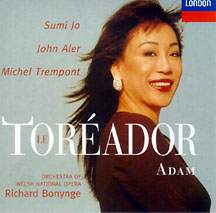 T. Sauvage, le
librettiste de ce ravissant petit opéra-comique dont Richard Bonynge
et Decca/London nous offrent aujourd’hui un superbe enregistrement,
a accompli le rare exploit d’avoir enrichi d’un mot une langue qu’il
ne connaissait pas. Ce mot, c’est «toréador», ou plutôt «torédor» -
forme originale, aujourd’hui obsolète, d’un faux mot espagnol qui
semble devoir son origine à une confusion parisienne entre «torero»
et «matador». L’Espagne elle-même n’en aurait jamais entendu parler,
si ce n’eût été, un quart de siècle plus tard, du succès universel
de Carmen... T. Sauvage, le
librettiste de ce ravissant petit opéra-comique dont Richard Bonynge
et Decca/London nous offrent aujourd’hui un superbe enregistrement,
a accompli le rare exploit d’avoir enrichi d’un mot une langue qu’il
ne connaissait pas. Ce mot, c’est «toréador», ou plutôt «torédor» -
forme originale, aujourd’hui obsolète, d’un faux mot espagnol qui
semble devoir son origine à une confusion parisienne entre «torero»
et «matador». L’Espagne elle-même n’en aurait jamais entendu parler,
si ce n’eût été, un quart de siècle plus tard, du succès universel
de Carmen...
Le Torédor (car c’est là son titre véritable)
est un pur joyau - et une redécouverte, car cette oeuvre d’Adolphe
Adam (1803-1856), très populaire au 19e siècle, avait pratiquement
été oubliée depuis. L’argument se réduit au triangle conventionnel :
Coraline, soprano colorature, mariée à Belflor, barbon basse-bouffe
ridicule et «torédor» à la retraite, aime Tracolin, ténor flûtiste,
et en est aimée de retour. Sur ce mince canevas, Adam a brodé une
musique aussi fine que légère et d’une étonnante unité stylistique
qui procède de fréquentes citations et d’une imitation constante et
habile de Grétry, le maître de l’opéra-comique du 18e siècle. À cela
vient se greffer toute une série d’éléments qui sont autant d’atouts
: des situations comiques, mais jamais vulgaires; un texte très
spirituel; l’usage abondant de la colorature féminine la plus
acrobatique; le recours à la forme du thème et variations (sur le
thème de «Ah vous dirais-je maman») et, trait de génie, la faculté
donnée à un personnage (Tracolin) de s’exprimer tant par la flûte
que par la voix, de sorte que, même lorsqu’il ne chante pas, le
jeune premier peut poursuivre son duo d’amour avec la colorature -
dans un registre stratosphérique!
L’exécution est de haut
niveau. Sans doute faut-il désormais se résigner à compter surtout
sur des non-Francophones (une Coréenne, un Américain) pour nous
faire apprécier la musique vocale française, mais quand ils sont
aussi bons que dans ce cas-ci, on aurait mauvaise grâce de se
plaindre. Le français chanté de John Aler, en particulier, confine à
la perfection. Celui de Sumi Jo n’est peut-être pas tout à fait
aussi pur, mais quelle technique et quelle aisance dans l’aigu!
L’oeuvre, étant un opéra-comique, comporte des dialogues parlés dont
Aler s’acquitte avec tout juste un soupçon d’accent. Par contre, on
a substitué une comédienne à Sumi Jo. Quant à Trempont, il s’impose
comme un candidat sérieux à la succession du regretté Jules Bastin.
Le livret d’accompagnement contient le texte chanté en français avec
traduction anglaise, de même qu’un synopsis et une introduction
détaillée, mais en anglais seulement. Pierre Marc
Bellemare
Schumann : Dichterliebe op. 42 &
Liederkreis
Matthias Goerne, baritone.
Vladimir
Ashkenazy, piano.
London 289-458-265-2 / Polygram
****
$$$
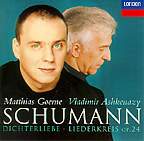 German lyric baritone
Matthias Goerne is only 30 but is already acclaimed as the most
exciting singer on the recital stage today. His Winterreise
recording on Hyperion was impressive and his Schubert Lieder on
London was even better. Now he tackles Schumann’s immortal cycles.
Goerne’s voice is a luxury vehicle, with a resonant timbre, warm
phonogenic projection, effortless soft notes and valorous fortes.
Nothing he sings is dull. His tender “Hör ich das Liedchen klingen”
and haunting “Ich hab im Traum geweinet” are simply breathtaking.
Ashkenazy’s accompaniment is at times sublime, at times ridiculously
loud (“Ein Jungling”) or fast (“Die Rose”). Still, this is a
treasure. German lyric baritone
Matthias Goerne is only 30 but is already acclaimed as the most
exciting singer on the recital stage today. His Winterreise
recording on Hyperion was impressive and his Schubert Lieder on
London was even better. Now he tackles Schumann’s immortal cycles.
Goerne’s voice is a luxury vehicle, with a resonant timbre, warm
phonogenic projection, effortless soft notes and valorous fortes.
Nothing he sings is dull. His tender “Hör ich das Liedchen klingen”
and haunting “Ich hab im Traum geweinet” are simply breathtaking.
Ashkenazy’s accompaniment is at times sublime, at times ridiculously
loud (“Ein Jungling”) or fast (“Die Rose”). Still, this is a
treasure.
Sony Masterworks
Heritage Series
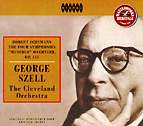 Sony is continuing its
attractive series of important remasterings from the Columbia
catalogue. The retro packaging features plenty of gorgeous
archival photos and artwork from the original LPs. Many of
these performances are unique classics. Here is a concise buyer’s
guide: Sony is continuing its
attractive series of important remasterings from the Columbia
catalogue. The retro packaging features plenty of gorgeous
archival photos and artwork from the original LPs. Many of
these performances are unique classics. Here is a concise buyer’s
guide:
**** Bidu Sayao: La Damoiselle élue & Italian Arias. MHK
63221
**** Bidu Sayao. Opera arias and Brazilian folksongs. MHK
62335
**** George London: Of Gods and Demons. MHK 62758
**** Antiphonal Music of Gabrieli. MHK 62353
**** Lotte Lenya sings Kurt Weill. MHK 63222.
*** Alexander Kipnis: Opera Arias and Songs. MHK 62354
*** Ljuba Welitsch: Complete Columbia Recordings
MH2K 62866
*** Brahms : Piano Concertos. Leon Fleisher.MH2K 63225
*** Liszt: Piano Concerto No.1. Claudio Arrau, piano. MHK
62338
*** Richard Strauss: Don Quixote, Horn Concerto No.1.
Szell/Cleveland Orchestra. MHK 63123.
*** Mahler: Symphony No. 1. Mitropoulos / Minneapolis Symphony.
MHK 62342
** Schumann: Symphonies No. 1-4. Szell/Cleveland. MH2K
62349.
** Piatigorsky: Great Cello Concertos. MHK 62876.
** Zino Francescatti: Great Violin Concertos. MH2K
62339.
** Richard Tucker Sings Verdi. MHK 62357.
** Sir Thomas Beecham: American Columbia Recordings 1942-1952.
MH2K 63366 Ewa Podlés: Not Just
Another Mezzo
 Widely known as the
“Naxos mezzo”, Polish diva Ewa Podlés is actually a contralto, with
a low range like a tenor, a rich middle and a soprano
extension. Podlés's excitingly butch sound lends itself
perfectly to the pants parts (male roles sung by women) written for
castratos and female mezzo-sopanos by Handel, Vivaldi and Rossini.
When people hear Podlés on the radio, they sometimes can’t tell if
it is a man or a woman singing. Widely known as the
“Naxos mezzo”, Polish diva Ewa Podlés is actually a contralto, with
a low range like a tenor, a rich middle and a soprano
extension. Podlés's excitingly butch sound lends itself
perfectly to the pants parts (male roles sung by women) written for
castratos and female mezzo-sopanos by Handel, Vivaldi and Rossini.
When people hear Podlés on the radio, they sometimes can’t tell if
it is a man or a woman singing.
Podlés's best-selling 1996
disc of Rossini arias (Naxos 8.553543) is the quickest and cheapest
introduction to her artistry. Her 1990 disc of arias by Handel,
Vivaldi, Purcell and Gluck (Forlane UCD 16620 / Domino Distribution)
reveals Podlés as the legitimate heir of Marilyn Horne. Her
recording of Russian melodies by Rachmaninov, Tchaikovsky and
Moussorgsky is the one of the best on the market (Forlane UCD 16683
/ Domino Distribution). The homey lyrics and comfortable range of
these songs (including Moussorgsky’s brilliant cycle of nursery
songs) allows the contralto to deploy a rainbow of expressive vocal
colour. Podlés is a unique artist who generates real
excitement among voice connoisseurs. Hear her live while you have
the chance. If you can’t attend a concert, pick up her recordings
before they go out of print. Eva Podlés performs Rossini arias with
the Orchestre Metropolitain at the Lanaudière Festival Amphitheatre
July 24, 1998. 20 H. $15-42. Tel: 800-561-4343. 514-759-4343.
www.lanaudiere.org. Podlés sings Rossini with the Edmonton Symphony
at Edmonton’s Winspear Centre, Oct. 1, 1998. Podlés gives a recital
of Mussorgsky, Rachmaninoff, Lutoslawski, Karlowicz and Chopin at
the Ford Centre for the Performing Arts, North York, Toronto,
October 14, 1998.
Britten :
Billy Budd
Kent Nagano / Hallé Orchestra
Erato
3984-21631-2 / Warner
*** $$$
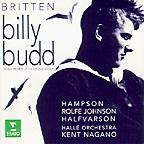 This is the world
premire commercial recording of the original four act 1951 version
of Benjamin Britten’s Billy Budd (a fine pirate of that 1951
premiere performance is available on VAIA 1034). The version of
Billy Budd that has predominated on world stages since then is
Britten’s 2-act version, created in 1961 by eliminating Captain
Vere’s presence from the so-called Captain’s muster scene at the end
of Act I (tenor Peter Pears, the original Vere, didn’t want to sing
in that scene). The difference between the 2 versions is minimal,
but the original version of the Captain’s muster, with a rousing
chorus and Billy’s pledging devotion to Captain Vere, and Vere’s
inspirational speech to the crew, is thrillingly superior to the
revision. This new Erato recording was carefully planned to follow
concert performances in May 1997 in Manchester’s Bridgewater Hall.
The orchestra and the cast of American and English singers,
including Thomas Hampson in the title role, are uniformly fine. The
Erato engineers have done almost too good a job capturing the voices
and the superb Hallé Orchestra under Kent Nagano. Many loud passages
will have you reaching for the volume control. Apart from that, this
is an excellent recording, though not better than Britten’s classic
1967 London/Decca studio recording. This is the world
premire commercial recording of the original four act 1951 version
of Benjamin Britten’s Billy Budd (a fine pirate of that 1951
premiere performance is available on VAIA 1034). The version of
Billy Budd that has predominated on world stages since then is
Britten’s 2-act version, created in 1961 by eliminating Captain
Vere’s presence from the so-called Captain’s muster scene at the end
of Act I (tenor Peter Pears, the original Vere, didn’t want to sing
in that scene). The difference between the 2 versions is minimal,
but the original version of the Captain’s muster, with a rousing
chorus and Billy’s pledging devotion to Captain Vere, and Vere’s
inspirational speech to the crew, is thrillingly superior to the
revision. This new Erato recording was carefully planned to follow
concert performances in May 1997 in Manchester’s Bridgewater Hall.
The orchestra and the cast of American and English singers,
including Thomas Hampson in the title role, are uniformly fine. The
Erato engineers have done almost too good a job capturing the voices
and the superb Hallé Orchestra under Kent Nagano. Many loud passages
will have you reaching for the volume control. Apart from that, this
is an excellent recording, though not better than Britten’s classic
1967 London/Decca studio recording.
Handel: Rodelinda
Nicholas Kraemer / Raglan
Baroque Players (Virgin 5452772/EMI)
** $$$
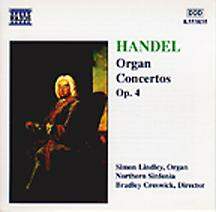 This is a long overdue
complete recording of Handel’s important opera Rodelinda, regina de
Longobardi (1725). The version used follows Handel’s earliest
edition but adds Bertarido’s Dec. 1725 aria “Vivi, tiranno,” which
is one of the opera’s high points. Perhaps the fact that the cast
was singing Rodelinda for the first time in their careers accounts
for the uneven performance. Sophie Daneman has a nice big voice that
can sound a bit dusty in high ornamented passages where flexibility
and purity are demanded. Mezzo Catherine Robbin’s excellent sense of
the baroque idiom makes her Eduige convincing, her voice is
commanding, but lacks freshness. Countertenor Daniel Taylor
demonstrates technical smarts and good taste in the part of
Bertarido, written for the castrato Senesino. Bass-baritone
Christopher Purves (Garibaldo), runs hot and cold, sometimes drab
and weary, sometimes solid. Tenor Adrian Thompson (Grimoaldo) is
often seriously off pitch. Nicholas Kraemer’s Raglan Players provide
clean accompaniment but there is little sense of dramatic unity. The
recorded sound is clinical, lacking warmth and
juice. This is a long overdue
complete recording of Handel’s important opera Rodelinda, regina de
Longobardi (1725). The version used follows Handel’s earliest
edition but adds Bertarido’s Dec. 1725 aria “Vivi, tiranno,” which
is one of the opera’s high points. Perhaps the fact that the cast
was singing Rodelinda for the first time in their careers accounts
for the uneven performance. Sophie Daneman has a nice big voice that
can sound a bit dusty in high ornamented passages where flexibility
and purity are demanded. Mezzo Catherine Robbin’s excellent sense of
the baroque idiom makes her Eduige convincing, her voice is
commanding, but lacks freshness. Countertenor Daniel Taylor
demonstrates technical smarts and good taste in the part of
Bertarido, written for the castrato Senesino. Bass-baritone
Christopher Purves (Garibaldo), runs hot and cold, sometimes drab
and weary, sometimes solid. Tenor Adrian Thompson (Grimoaldo) is
often seriously off pitch. Nicholas Kraemer’s Raglan Players provide
clean accompaniment but there is little sense of dramatic unity. The
recorded sound is clinical, lacking warmth and
juice.
Mendelssohn: Concertos
for violin, piano and strings
Andreas Staier, fortepiano.
Rainer Kussmaul, violin
Concerto Köln. Teldec 0630-13152-2
** $$$
Mendelssohn’s
Concerto for piano and strings in A minor, written in 1822, when the
composer was just 13, was rediscovered earlier in this century. It
is a bright little jewel, well-made and adventurous but not a
masterpiece. Andreas Staier, the foremost fortepianist of our day,
is a sensitive player but the outer movements never really take
flight, perhaps because his circa-1825 fortepiano has such a small
sound. The slow movement is very slow indeed. The Concerto for
violin, piano and strings in D minor (1823) comes across much
better, with better balance between the fortepiano and violin.
Violinist Rainer Kussmaul draws enviable colors from his
sweet-sounding Stradivarius. The fortepiano seems primitive by
comparison. The Concerto Köln provides healthy backup, with no
flaws, but this music gives them little opportunity to shine. The
recording, done in a German radio studio, sounds rather dry and
cold, reflecting a clinical ambience. The Concerto Köln performs at
the Lanaudière Festival July 29 and the Lamèque Festival Aug.
1-2.
Puccini : Suor Angelica
Richard
Bonynge /National Philharmonic Orchestra
London Opera Gala
289-458-218-2
*** $$
 Joan Sutherland’s
long-suppressed 1978 studio recording of Suor Angelica deserves to
have been released sooner. The all-female cast is strong, with
excellent contributions from Isobel Buchanan, Elizabeth Connell,
Della Jones and Christa Ludwig. Sutherland’s portrayal of the
sinning sister is moving and vocally impressive (though she can’t
float the required high pianissimo and her Italian vowels are
typically Sutherlandized). Bonynge leads a compellingly gorgeous
orchestral performance. The recorded sound is
excellent. Joan Sutherland’s
long-suppressed 1978 studio recording of Suor Angelica deserves to
have been released sooner. The all-female cast is strong, with
excellent contributions from Isobel Buchanan, Elizabeth Connell,
Della Jones and Christa Ludwig. Sutherland’s portrayal of the
sinning sister is moving and vocally impressive (though she can’t
float the required high pianissimo and her Italian vowels are
typically Sutherlandized). Bonynge leads a compellingly gorgeous
orchestral performance. The recorded sound is
excellent.
Marilyn Horne:
Rossini Heroes and Heroines
London 289-458-219-2
****
$$
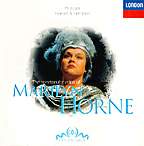 Mezzo-soprano Marilyn
Horne was almost single-handedly responsible for the resurrection of
the bel canto repertoire in America. If you have never heard Horne’s
recordings, imagine Cecilia Bartoli with cojones. This generous
74-minute disc, drawn from LPs recorded by Horne in the 1960s and
1970s, collects all of Rossini’s most famous arias for mezzo-soprano
and castrato. This is the cream of Horne’s recorded legacy, some of
the best singing of the century. Mezzo-soprano Marilyn
Horne was almost single-handedly responsible for the resurrection of
the bel canto repertoire in America. If you have never heard Horne’s
recordings, imagine Cecilia Bartoli with cojones. This generous
74-minute disc, drawn from LPs recorded by Horne in the 1960s and
1970s, collects all of Rossini’s most famous arias for mezzo-soprano
and castrato. This is the cream of Horne’s recorded legacy, some of
the best singing of the century.
Johannes Ockeghem: Requiem & Missa Fors
Seulement
Wickham / The Clerks’ Group
ASV Gaudeamus CD
GAU 168
*** $$$
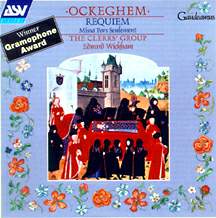 This is perhaps the
finest recording to date of the oldest extant polyphonic requiem.
The Clerks’ Group’s fresh reading coincides with the quincentenary
of Ockeghem’s death. It is the only satisfying recording of the
requiem to use women’s’ voices for the top line. The choir brings a
celebratory, even triumphant approach to the music, while allowing
one to hear the intricate detailing that is a hallmark of Ockeghem's
style. The Clerks deliver full choral sections strongly, while the
florid sections are sung with great agility and swagger. This is
also the first recording of Ockeghem’s Missa Fors Seulement, a mere
five-hundred and ten years after its composition! Altogether an
extremely fine recording. John
Stephenson This is perhaps the
finest recording to date of the oldest extant polyphonic requiem.
The Clerks’ Group’s fresh reading coincides with the quincentenary
of Ockeghem’s death. It is the only satisfying recording of the
requiem to use women’s’ voices for the top line. The choir brings a
celebratory, even triumphant approach to the music, while allowing
one to hear the intricate detailing that is a hallmark of Ockeghem's
style. The Clerks deliver full choral sections strongly, while the
florid sections are sung with great agility and swagger. This is
also the first recording of Ockeghem’s Missa Fors Seulement, a mere
five-hundred and ten years after its composition! Altogether an
extremely fine recording. John
Stephenson
Von Karajan
“Live” on Deutsche Grammophon
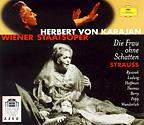 Four live opera
recordings from the Austrian Radio archives focus attention on
Herbert von Karajan’s stormy years at the Vienna State Opera
(1957-1964). The recordings are all in mono sound with considerable
ambient noise (coughing, loud prompting). Four live opera
recordings from the Austrian Radio archives focus attention on
Herbert von Karajan’s stormy years at the Vienna State Opera
(1957-1964). The recordings are all in mono sound with considerable
ambient noise (coughing, loud prompting).
• The earliest
is a March 9, 1960 recording of Pizzetti’s Murder in the Cathedral,
the only complete recording of this rarity (DG 457-681, not
submitted for review).
• Three years later Karajan
conducted Wagner’s Tannhäuser (DG 457-682. * $$$) for the last time
- the recording from the January 8, 1963, performance is also
Karajan’s only commercially available Tannhäuser. The maestro
delivers a steely, Olympian, often dull reading of Wagner’s sensual
score. The orchestra is closely miked, but the sections don’t blend.
The shallowness of the sonic image renders the string section flat
and shrill. The singers are disappointing. Hans Beirer (Tannhäuser)
is in extremis from the first note. Gré Brouwenstein lacks the
soaring silvery tonal purity necessary for Elisabeth. Christa Ludwig
(Venus) is adequate but badly miked. Eberhard Wächter (Wolfram) is
heavy but competent. A recording for Karajan fanatics only.
• Karajan’s April 1, 1963 recording of Monteverdi’s
L’incoronazione di Poppea (DG 457-674. ** $$$$) is a fascinating
monument of wildly inauthentic, unoriginal performance practices.
Monteverdi’s music is barely recognizable under arranger Erich
Kraack’s heavy orchestration, additional music, altered harmonics
and rhythms. The cast of top notch opera singers (including Sena
Jurinac, Gerhard Stolze, Margarita Lilowa) belt out Monteverdi as if
it were Puccini. The singing is gorgeous, well worth having on an
excerpts disc as a curiosity. But Karajan leads a dreadfully slow,
oppressive performance, and the recorded sound is mediocre. For fans
of the bizarre only.
• This June 11, 1964, recording of
Richard Strauss’s Die Frau ohne Schatten (DG 457-678. *** $$$$)
celebrates the centenary of the composer’s birth and marks Karajan’s
farewell to the Vienna State Opera (until 1977). The cast is very
good. Leonie Rysanek is a classic Empress, though her high notes are
not always secure. Christa Ludwig and Walter Berry deliver
wonderfully dramatic accounts of the Dyer’s Wife and Barak. Jess
Thomas (Emperor) is at the height of his power. Grace Hoffmann is an
exciting Nurse. The recorded sound is much better than on previous
broadcasts, almost studio quality. The orchestra is clear, balanced,
and well blended. This is a great performance, but purists will be
outraged by Karajan’s huge cuts and reorganisation of Act
2.
Schumann: Lieder
Juliane Banse, soprano. Olaf Bär, baritone. Helmut Deutsch,
piano
EMI 7243 5 56579 2 3
*** $$$
German baritone Olaf Bär’s final (and excellent) recording for
EMI pairs him with German soprano Juliane Banse. Both are singers of
impeccable taste and musicianship. Schumann wrote Myrten in 1840,
during a “manic” period of tremendous creative activity. Myrten is
more of an anthology than a true cycle, but the 26 songs are some of
the greatest lieder extant. An added bonus is Zwölf Gedichte aus
Ruckert’s Liebesfrühling, twelve songs set to texts by the poet
Ruckert. This composition was a collaboration between Robert
Schumann and his beloved wife Clara. Bär brings much experience and
musical wisdom to his interpretations, though his voice has hardened
somewhat with time and his declamatory style in several of the songs
can be wearisome. He is at his best in the more contemplative songs
such as “Du bist wie eine Blume.” Fresh-voiced Juliane Banse sings
with consistently lovely tone, particularly in the middle register.
Helmut Deutsch is, as ever, the exemplary accompanist. Highly
recommended. Joseph So
Joseph Martin Kraus: Symphonies & Overture
Petter Sundkvist / Swedish Chamber Orchestra Naxos 8.553734
*** $
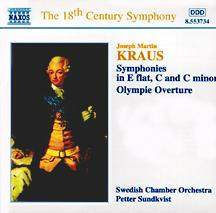 Kraus was a prolific
German composer who made his reputation at the Swedish royal court
between 1778 and his death in 1792. He has been called “the Swedish
Mozart” though there is nothing nationalistically Swedish about this
music. The 3 symphonies on this disc (Kraus composed twelve in
total) are in the tradition of Haydn, Gluck and Mozart, composers
Kraus knew personally. The three-movement form (no dance movement)
and thematic material are classical, reserved and Olympian, making
this much more than trivial background music. The Swedish Chamber
Orchestra, founded in 1995, delivers impeccable performances. The
recorded sound (Örebrö Concert Hall, Sweden) is impressively full
and intimate. Good notes in English, French, and German but
biographies in English only. Kraus was a prolific
German composer who made his reputation at the Swedish royal court
between 1778 and his death in 1792. He has been called “the Swedish
Mozart” though there is nothing nationalistically Swedish about this
music. The 3 symphonies on this disc (Kraus composed twelve in
total) are in the tradition of Haydn, Gluck and Mozart, composers
Kraus knew personally. The three-movement form (no dance movement)
and thematic material are classical, reserved and Olympian, making
this much more than trivial background music. The Swedish Chamber
Orchestra, founded in 1995, delivers impeccable performances. The
recorded sound (Örebrö Concert Hall, Sweden) is impressively full
and intimate. Good notes in English, French, and German but
biographies in English only.
Jacob Obrecht: Missa Caput & Salve Regina
Summerly / Oxford Camerata
(Naxos 8.553210)
***
$
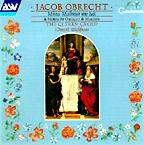 The Flemish composer
Jacob Obrecht (c. 1450-1505) was a celebrated innovator in his own
time. His Missa Caput is a fine example of his linear style of
writing. All of the works on this disc are based on plainsong, the
Missa Caput taking its cue from the plainsong for Maundy Thursday,
Venit ad Petrum. Ockeghem contributed to the art of the parody mass,
and Obrecht was just as fascinated with the ‘remake’ mass. His Missa
Caput reworks the division and layout of the cantus firmus of the
famous English mass of the same name from the 1440’s. The Oxford
Camerata delivers a performance superior to that of the more
expensive recent Clerks’ Group Obrecht recording (ASV Gaudeamus GAU
171). The Camerata sings every line with care, paying special
attention to shape of phrase. The singers are typical of Oxbridge
chapel choir graduates, with a warm, well disciplined sound, never
lacking in style or polish. John
Stephenson The Flemish composer
Jacob Obrecht (c. 1450-1505) was a celebrated innovator in his own
time. His Missa Caput is a fine example of his linear style of
writing. All of the works on this disc are based on plainsong, the
Missa Caput taking its cue from the plainsong for Maundy Thursday,
Venit ad Petrum. Ockeghem contributed to the art of the parody mass,
and Obrecht was just as fascinated with the ‘remake’ mass. His Missa
Caput reworks the division and layout of the cantus firmus of the
famous English mass of the same name from the 1440’s. The Oxford
Camerata delivers a performance superior to that of the more
expensive recent Clerks’ Group Obrecht recording (ASV Gaudeamus GAU
171). The Camerata sings every line with care, paying special
attention to shape of phrase. The singers are typical of Oxbridge
chapel choir graduates, with a warm, well disciplined sound, never
lacking in style or polish. John
Stephenson
Jean-Baptiste Lully : Musique de Ballet pour le
Roi-Soleil
Kevin Mallon / Aradia Baroque Ensemble
Naxos
8.554003
*** $
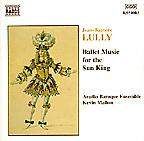 Ce charmant (et
généreux, avec ses 73 minutes) disque contient des extraits de 6
ballets français composés durant les premières années de Lully
(1654-1670) à la cour de Louis XIV. Les gigues, gavottes,
ritournelles, majestueuses chaconnes et bourrées animées, furent
écrites pour des personnages de scène aussi divers que
docteurs, polichinelles, scaramouches, arlequins, maures, coquettes,
braves jaloux, satyres, singes dansants, suisses et courtisans. Avec
ses 16 instrumentistes pour cordes, l’Ensemble Baroque Aradia est
une réplique torontoise des Petits Violons du Roy de Lully.
L’exécution est vive, digne et, le plus important, agréable. Ni
fausses notes ni maniérisme déplacé ou embarrassant, comme on en
retrouve parfois dans l’exécution de la musique ancienne, ne
viennent troubler notre plaisir. Des 35 plages du disque, sept sont
consacrées à la musique vocale et chantées par deux sopranos
canadiennes fort bien assorties: Mary Enid Haines et Sharla
Nafziger. Ce charmant (et
généreux, avec ses 73 minutes) disque contient des extraits de 6
ballets français composés durant les premières années de Lully
(1654-1670) à la cour de Louis XIV. Les gigues, gavottes,
ritournelles, majestueuses chaconnes et bourrées animées, furent
écrites pour des personnages de scène aussi divers que
docteurs, polichinelles, scaramouches, arlequins, maures, coquettes,
braves jaloux, satyres, singes dansants, suisses et courtisans. Avec
ses 16 instrumentistes pour cordes, l’Ensemble Baroque Aradia est
une réplique torontoise des Petits Violons du Roy de Lully.
L’exécution est vive, digne et, le plus important, agréable. Ni
fausses notes ni maniérisme déplacé ou embarrassant, comme on en
retrouve parfois dans l’exécution de la musique ancienne, ne
viennent troubler notre plaisir. Des 35 plages du disque, sept sont
consacrées à la musique vocale et chantées par deux sopranos
canadiennes fort bien assorties: Mary Enid Haines et Sharla
Nafziger.
Schumann : Concerto pour Violoncelle
Pieter Wispelwey, violoncelle
Australian Chamber Orchestra
Channel Classics CCS 11097 / SRI
** $$$
Schumann : Concerto pour Violoncelle;
Symphonie No 4
Christophe Coin, violoncelle
Herreweghe /
Orchestre des Champs Elysées
harmonia mundi HMC 901598 / SRI
*** $$$
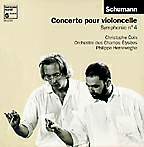 L’année dernière, le violoncelliste
hollandais Pieter Wispelwey annonçait que son nouvel enregistrement
du concerto pour violoncelle de Schumann surpasserait les 20 autres
sur le marché, spécialement celui, récent, de Christophe Coin («il
utilise trop de vibrato nerveux», etc.). Maintenant que j’ai les
deux enregistrements sous la main, je trouve que celui de
Christophe Coin surpasse de loin celui de Wispelwey. Le jeu de ce
dernier est techniquement superbe mais son interprétation trop
intellectuelle le rend ennuyeux. Son Schumann est dénudé d’émotion.
Nous attendions une chanson et nous voilà devant une partie
d’échecs. Le Australian Chamber Orchestra, un groupe de jeunes, est
passable. L’enregistrement n’est pas rehaussé par l’acoustique sèche
du Muziekcenter Frits Philipszaal d’Eindhoven, en Hollande. Le son
est rude et brillant, sans réverbération chaleureuse. J'ai opté avec
soulagement pour Christophe Coin sur harmonia mundi. Le violoncelle
et l’ensemble sont réunis dans un jeu charmant, lyrique et pleine de
joie sensuelle. Herreweghe dirige une exécution enjouée, une de ses
meilleures. L’acoustique est veloutée et bien équilibrée. Les
«instruments authentiques» ont un son naturel. Herreweghe est
satisfait de nous offrir une musique délicieuse et nous lui en
sommes reconnaissants. L’année dernière, le violoncelliste
hollandais Pieter Wispelwey annonçait que son nouvel enregistrement
du concerto pour violoncelle de Schumann surpasserait les 20 autres
sur le marché, spécialement celui, récent, de Christophe Coin («il
utilise trop de vibrato nerveux», etc.). Maintenant que j’ai les
deux enregistrements sous la main, je trouve que celui de
Christophe Coin surpasse de loin celui de Wispelwey. Le jeu de ce
dernier est techniquement superbe mais son interprétation trop
intellectuelle le rend ennuyeux. Son Schumann est dénudé d’émotion.
Nous attendions une chanson et nous voilà devant une partie
d’échecs. Le Australian Chamber Orchestra, un groupe de jeunes, est
passable. L’enregistrement n’est pas rehaussé par l’acoustique sèche
du Muziekcenter Frits Philipszaal d’Eindhoven, en Hollande. Le son
est rude et brillant, sans réverbération chaleureuse. J'ai opté avec
soulagement pour Christophe Coin sur harmonia mundi. Le violoncelle
et l’ensemble sont réunis dans un jeu charmant, lyrique et pleine de
joie sensuelle. Herreweghe dirige une exécution enjouée, une de ses
meilleures. L’acoustique est veloutée et bien équilibrée. Les
«instruments authentiques» ont un son naturel. Herreweghe est
satisfait de nous offrir une musique délicieuse et nous lui en
sommes reconnaissants.
William Walton : Symphony No.1
Paul Daniel /
English Northern Philharmonia
Naxos 8.553180
*** $
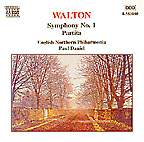 This second disc in
Naxos’s cycle of Walton symphonies is as good as the first one,
which is very good indeed. Conductor Paul Daniel is a British
Wunderkind best known as Music Director of the Leeds-based Opera
North (the English Northern Philharmonia is Opera North’s
orchestra). Daniel and his band give a dynamically engaging and
suspenseful reading of Walton’s first symphony. The instrumentalists
are top notch, the brass solid and the strings crisply responsive.
The recorded sound is clear and well-balanced, robust, colorful and
impressive. If you don’t know Walton’s symphonies, this super-budget
series is a great place to start. This second disc in
Naxos’s cycle of Walton symphonies is as good as the first one,
which is very good indeed. Conductor Paul Daniel is a British
Wunderkind best known as Music Director of the Leeds-based Opera
North (the English Northern Philharmonia is Opera North’s
orchestra). Daniel and his band give a dynamically engaging and
suspenseful reading of Walton’s first symphony. The instrumentalists
are top notch, the brass solid and the strings crisply responsive.
The recorded sound is clear and well-balanced, robust, colorful and
impressive. If you don’t know Walton’s symphonies, this super-budget
series is a great place to start.
Mahler : Symphony No.6
Thomas Sanderling / St.
Petersburg Philharmonic
RS 953-0186 / Distribution Pelleas
*** $$$
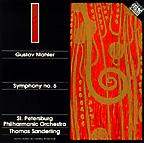 A magnificent installment in
Thomas Sanderling’s projected cycle of Mahler symphonies. The
orchestra is superb. Sanderling is one of those rare conductors who
has a vision and knows how to impose it. The real marvel of this
recording (made in 1995 in the Grand Hall of the St. Petersburg
Philharmonic) is the crystalline sound, with incredible depth and
detail - an audiophile’s dream. The only problem is that this 81
minute symphony is on 2 full price cds. Three minutes less music
would have fit on one cd. Notes in English, French and
Italian. A magnificent installment in
Thomas Sanderling’s projected cycle of Mahler symphonies. The
orchestra is superb. Sanderling is one of those rare conductors who
has a vision and knows how to impose it. The real marvel of this
recording (made in 1995 in the Grand Hall of the St. Petersburg
Philharmonic) is the crystalline sound, with incredible depth and
detail - an audiophile’s dream. The only problem is that this 81
minute symphony is on 2 full price cds. Three minutes less music
would have fit on one cd. Notes in English, French and
Italian.
En Bref / CD Shorts
• Dvorak : String Quartet No. 12, Terzetto,
Bagatelles
Prazak Quartet. Praga PRD 250 110 / SRI.
****
$$$
• Rachmaninov : Aleko, Francesca da Rimini,
The Miserly Knight
Neeme Järvi / Gothenburg Symphony
Deutsche Grammophon /Polygram
**** $$$
• de Victoria / Pujol : Feria VI in Passione
Domini
La Colombina. Accent ACC 97124D / SRI.
*** $$$
• Musica Intima : Choral Music
MI-001/SRI
*** $$$
• Canadian Safari : Canadian Folk Music For
Choir
Chor Leoni. Skylark Music 9801/SRI
*** $$$.
• Holst : Beni Mora, Somerset Rhapsody
David Lloyd-Jones / Royal Scottish National Orchestra. Naxos
8.553696
*** $
• Monteverdi : Ottavo Libro de’ Madrigali
Rinaldo Alessandrini / Concerto Italiano Opus 111 OPS 30-187
*** $$$
• Berwald : Symphonies No. 1-4
Okko
Kamu / Helsingborg Symphony Orchestra Naxos 8.553051/52
*** $
• Bach : The Well-Tempered Clavier Book
II
Lagacé / Organ of Eglise Immaculée-Conception, Montréal
Analekta FL 2 3015, FL 2 3016, FL 2 3017
*** $$$
• Vivaldi : Concerti e Cantate
Rinaldo Alessandrini / Concerto Italiano. Opus 111 OPS-30-181
*** $$$
• Vivaldi : Gloria & Magnificat
Rinaldo Alessandrini / Concerto Italiano. Opus 111 OPS-30-195
*** $$$
• Boismortier : Ballets de Village et
Sérénade
Hervé Niquet / Le Concert Spirituel. Naxos 8.553296
*** $
• Raymond Daveluy : Five Sonatas for
Organ
Rachel Laurin / The von Beckerath organ of lL'Oratoire
Saint-Joseph
CBC Musica Viva MVCD 1111/2
*** $$$
• Sibelius : Symphony 1 & 2, Tone
Poems
Various artists. Sony Essential Classics Take 2. SB2K
63260
*** $
• Debussy : Great Orchestral Works
Various artists. Sony Essential Classics Take 2. SB2K 63244
*** $
• Beethoven : Symphony No. 6, etc.
Various artists. Sony Essential Classics Take 2. SB2K 63240
** $
• Mozart : Sonatas, fantasies and rondos for
fortepiano
Jos van Immerseel, fortepiano. Sony Vivarte S2K
62879.
*** $$$
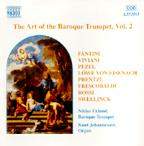 •
Art of the Baroque Trumpet Vol. 2 •
Art of the Baroque Trumpet Vol. 2
Naxos 8.553593
*** $
•
Janacek : Jenufa
Jaroslav Vogel / Prague National
Theatre Orchestra and Chorus
Supraphon Mono SU 3331-2 602 / SRI
** $$$
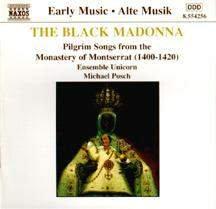 • The Black Madonna : Pilgrim Songs from
Montserrat • The Black Madonna : Pilgrim Songs from
Montserrat
Michael Posch / Ensemble Unicorn. Naxos
8.554256
** $
• Ben Heppner : Dedication
Ben
Heppner, tenor. Craig Rutenberg, piano.
RCA Victor Red Seal
09026-63104-2
** $$$
• Franck & Chausson : Chamber Music
Quatuor Ludwig. Michaël Levinas, piano. Naxos 8.553645
** $
• Sibelius & Mendelssohn : Violin
Concertos
Sarah Chang, violin. Mariss Jansons / Berliner
Philharmoniker.
EMI 5564182
** $$$
• Dame Janet Baker : Songs (compilation)
Richard Hickox/City of London Sinfonia.
Virgin 5614692 / EMI
** $
• Schubert : Winterreise & Lieder
(compilation)
Arleen Auger, Lambert Orkis. Thomas Allen,
Roger Vignoles.
Virgin 5614572/EMI
** $
•Tchaikovsky:Piano Concertos
Mikhail
Pletnev, piano. Vladimir Fedoseyev/ The Philharmonia
Virgin
5614632/EMI
** $
•Tchaikovsky : Piano Concerto No.1
Emil Gilels, piano. Fritz Reiner / Chicago Symphony Orchestra
RCA Victor Living Stereo 09026-68530-2
** $$$
• Beethoven & Mendelssohn : Violin
Concertos
Jascha Heifetz, violin.
Charles Munch / Boston
Symphony Orchestra
RCA Living Stereo 09026-68980-2
** $$
• Sibelius: Symphonies No. 1-4
Osmo
Vänskä / Lahti Symphony Orchestra. BIS-CD-861/2
** $$$
•Brahms: Piano Concerto No. 2
Maurizio Pollini, piano. Claudio Abbado / Berliner
Philharmoniker
Deutsche Grammophon 453-505
** $$$
• Schubert : Lieder
Anne Sofie von
Otter, mezzo-soprano. Bengt Forsberg, piano
Deutsche Grammophon
453-481 / Polygram
** $$$
• Boito: Mefistofele
Riccardo Muti /
Teatro alla Scala
RCA Red Seal 090226-68284
** $$$
• German Opera Arias
Kiri Te Kanawa,
soprano. Julius Rudel / Philharmonia Orchestra
EMI 5564172
** $$$
• Mozart : Don Giovanni
Sir Georg
Solti / London Philharmonic Orchestra
London 455-0500-2 /
Polygram
** $$$
• Prokofiev : Ivan the Terrible
Gergiev / Rotterdam Philharmonic. Philips 456-645
** $$$
• Baroque Arias (compilation)
Yoshikazu Mera, counter-tenor. BIS CD-919 / SRI.
** $$$
• Verdi : Don Carlos
Antonio Pappano/
Orchestre de Paris (EMI 556152)
** $$$
• Verdi Il Trovatore
Herbert
von Karajan/ La Scala (EMI 5563332) ** $$
• Mozart : Don Giovanni
Jean-Claude
Malgoire / La Grande Écurie & La Chanbre du Roy. Astrée E 8500 /
Interdisc
** $$
• Handel : Organ Concertos
Simon
Lindley, Organ. Bradley Creswick / The Northern Sinfonia
Naxos
8.553835
** $
• My World
Angela Gheorghiu, soprano
/ Malcolm Martineau, piano
London 289 458 360-2 /Polygram
**
$$$
• Britten: Choral Edition Vol. 2
Paul
Spicer / Finzi Singers
Chandos CHAN 9598 /SRI
** $$$
• Sallie Chisum Remembers Billy The Kid
Barbara Bonney, soprano / André Previn, piano
London
289-455-511-2
** $$$
• Berlioz: Les Troyens (Grand Scenes)
Charles Dutoit / Montreal Symphony Orchestra
London
289-458-208-2 / Polygram
** $$
• An Die Musik: Schubert Songs and Piano
Transcriptions
Kevin McMillan, baritone; Paul Stewart, piano
CBC Records MVCD 1106
** $$$
• Shostakovich : Symphony No. 7
“Leningrad”
Valeri Polyansky / Russian State Symphony
Orchestra
Chandos CHAN 9621 / SRI
** $$$
• Shostakovich : Symphony No. 7
“Leningrad”
Mark Wigglesworth / BBC National Orchestra of
Wales
BIS CD 873 / SRI
* $$$
• Beethoven : Fidelio
Sir Charles
Mackerras / Scottish Chamber Orchestra
Telarc 2 CD-80439 /
polygram
* $$$
• Mozart : Complete Works for Horn and
Orchestra
Michael Thompson, horn. Bournemouth Sinfonietta.
Naxos 8.553592
* $
• Gavin Bryars : A Man In A Room,
Gambling
Gavin Bryars Ensemble. Point Music 289-456-514-2 /
Polygram
* $$$
• Holst: The Planets
Yoel Levi
/ Atlanta Symphony Orchestra
Telarc CD-80466 /Polyram
* $$$
• The Dark Is My Delight: Sixteenth Century
Lute Songs
Brian Asawa, countertenor. David Tayler, lute
RCA Red Seal 9026-68818 / BMG
* $$$
• Gershwin & Ravel: Piano Concertos
Hélène Grimaud, piano. David Zinman / Baltimore Symphony
Orchestra.
Erato 0630-19571-2 / Warner
* $$$
• Memories of Love: Russian
Romances
Galina Gorchakova, soprano
Philips 446-720 /
Polygram
* $$$
| 

